Filter by
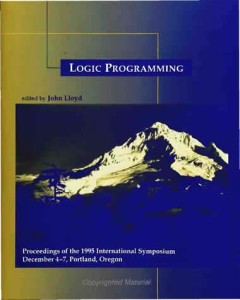
Logic Programming: The 1995 International Symposium
"December 4-7, 1995, Portland, Oregon The International Logic Programming Symposium is one of two major international conferences sponsored by the Association of Logic Programming. It is held annually in North America. The theme for the 1995 conference is "Declarative Systems," particularly the integration of the logic programming, functional programming, and object-oriented programming paradig…
- Edition
- 1
- ISBN/ISSN
- 9780262291248
- Collation
- -
- Series Title
- -
- Call Number
- -
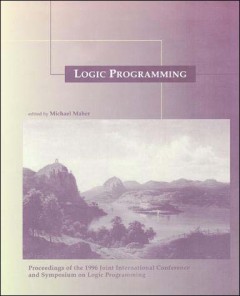
Logic Programming: Proceedings of the 1996 Joint International Conference and…
v
- Edition
- 1
- ISBN/ISSN
- 9780262291309
- Collation
- -
- Series Title
- -
- Call Number
- -
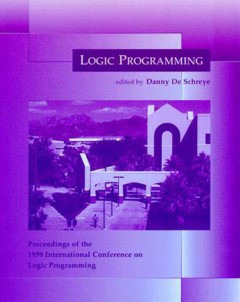
Logic Programming: Proceedings of the Tenth International Conference on Logic…
"The Tenth International Conference on Logic Programming, sponsored by the Association for Logic Programming, is a major forum for presentations of research, applications, and implementations in this important area of computer science. Logic programming is one of the most promising steps toward declarative programming and forms the theoretical basis of the programming language Prolog and its va…
- Edition
- 1
- ISBN/ISSN
- 9780262291460
- Collation
- -
- Series Title
- -
- Call Number
- -
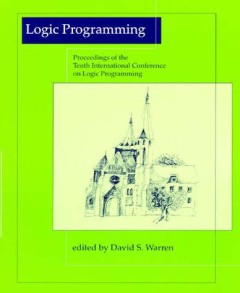
Logic Programming: Proceedings of the 1999 International Conference on Logic …
Includes tutorials, lectures, and refereed papers on all aspects of logic programming, including theoretical foundations, constraints, concurrency and parallelism, deductive databases, language design and implementation, nonmonotonic reasoning, and logic programming and the Internet.The International Conference on Logic Programming, sponsored by the Association for Logic Programming, includes t…
- Edition
- 1
- ISBN/ISSN
- 9780262291118
- Collation
- -
- Series Title
- -
- Call Number
- -
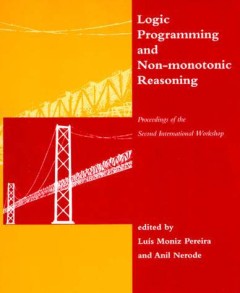
Logic Programming and Non-Monotonic Reasoning: Proceedings of the Second Inte…
"This is the second in a series of workshops that are bringing together researchers from the theoretical end of both the logic programming and artificial intelligence communities to discuss their mutual interests. This workshop emphasizes the relationship between logic programming and non-monotonic reasoning.Luis' Moniz Pereira is Professor in the Department of Computer Science at the Universid…
- Edition
- 1
- ISBN/ISSN
- 9780262291378
- Collation
- -
- Series Title
- -
- Call Number
- -
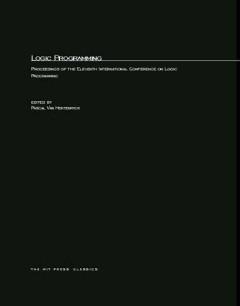
Logic Programming: The 11th International Conference
Conference proceedings presenting the state-of-the-art in Logic Programming.
- Edition
- 1
- ISBN/ISSN
- 9780262257145
- Collation
- -
- Series Title
- -
- Call Number
- -
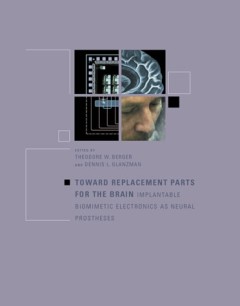
Toward Replacement Parts for the Brain: Implantable Biomimetic Electronics as…
A Bradford book.""This book has its origins in a meeting, entitled "Toward replacement parts for the brain: intracranial implantations of hardward models of neural circuitry" that took place in Washington, D.C. in August 1989"--Preface.The continuing development of implantable neural prostheses signals a new era in bioengineering and neuroscience research. This collection of essays outlines cur…
- Edition
- -
- ISBN/ISSN
- 9780262268226
- Collation
- 1 online resource (ix, 405 pages) :illustrations
- Series Title
- -
- Call Number
- -

A Century of Electrical Engineering and Computer Science at MIT, 1882–1982
Electrical engineering is a protean profession. Today the field embraces many disciplines that seem far removed from its roots in the telegraph, telephone, electric lamps, motors, and generators. To a remarkable extent, this chronicle of change and growth at a single institution is a capsule history of the discipline and profession of electrical engineering as it developed worldwide. Even when …
- Edition
- -
- ISBN/ISSN
- 9780262291033
- Collation
- 1 online resource (xi, 423 pages) :illustrations
- Series Title
- -
- Call Number
- -
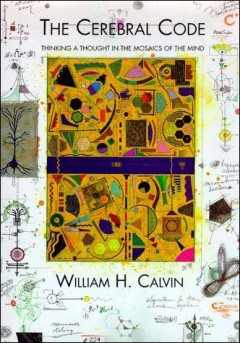
The Cerebral Code: Thinking a Thought in the Mosaics of the Mind
"A Bradford book."The Cerebral Code proposes a bold new theory for how Darwin's evolutionary processes could operate in the brain, improving ideas on the time scale of thought and action. Jung said that dreaming goes on continuously but you can't see it when you're awake, just as you can't see the stars in the daylight because it is too bright. Calvin's is a theory for what goes on, hidden from…
- Edition
- -
- ISBN/ISSN
- 9780262269711
- Collation
- 1 online resource (256 pages) :illustrations
- Series Title
- -
- Call Number
- -

Neurophilosophy of free will :from libertarian illusions to a concept of natu…
"A Bradford book."Walter applies the methodology of neurophilosophy to one of philosophy's central challenges, the notion of free will. Neurophilosophical conclusions are based on, and consistent with, scientific knowledge about the brain and its functioning.Neuroscientists routinely investigate such classical philosophical topics as consciousness, thought, language, meaning, aesthetics, and de…
- Edition
- -
- ISBN/ISSN
- 9780262285759
- Collation
- 1 online resource (xiii, 391 pages)
- Series Title
- -
- Call Number
- -
 Computer Science, Information & General Works
Computer Science, Information & General Works  Philosophy & Psychology
Philosophy & Psychology  Religion
Religion  Social Sciences
Social Sciences  Language
Language  Pure Science
Pure Science  Applied Sciences
Applied Sciences  Art & Recreation
Art & Recreation  Literature
Literature  History & Geography
History & Geography